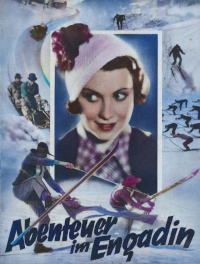
Original Title: Abenteuer im Engadin. Sports comedy 1932; 92 min.; Director: Max Obal; Cast: Guzzi Lantschner, Walter Riml, Hella Hartwich, Arnold Hasenclever, Uli Ritzer; Sokal-Aafa-Tobis-Klangfilm.
A guy from Hamburg argues with his girlfriend because of her lack of interest in sports. She now goes to Arosa, trains, and ultimately defeats him in multiple competitions.
Summary
At a party hosted by the Ice Skating Club, young Hella wins the main prize in a raffle: a pair of skis. However, Hella has no interest in winter sports or similar activities, much to the annoyance of Harry, her enthusiastic winter sportsman fiancé. Harry belittles Hella as a spoiled luxury creature who doesn’t fit into the modern era with her aversion to sports. Deeply offended, Hella decides to prove Harry wrong.
The scene then transitions to a winter wonderland of ice and snow, brimming with sports enthusiasm and vibrant joy, in a bustling Swiss winter resort. Hella has come here to train in all the winter sports disciplines. Fietje and Tetje, two carpenters from Hamburg, are also present, trying to make a living as waiters, house servants, baggage carriers, and ski instructors. This inseparable pair, one burly and the other small, takes it upon themselves to look after Hella and provide her with instruction in all the sports, to the best of their abilities.
Naturally, Harry, the lover of winter sports, soon appears on the scene. However, Hella continues to play the offended party and wants nothing to do with him, even though she feels embarrassed seeing Harry flirt with other attractive women. Jealousy haunts her, and she believes it’s best to leave. But Fietje and Tetje, both of whom have fallen in love with the charming girl, disagree. They manage to halt Hella from leaving the moving train and convince her to stay at least until the major sports competitions take place.
In these competitions, only men are allowed to participate. Nevertheless, Hella knows how to navigate the situation. Disguised as a man and standing shoulder to shoulder with Harry, who fails to recognize her at first, she competes in an exhilarating ski joring race. Moreover, she outpaces her rival by half a second in the bobsleigh competition. However, during the grand downhill race, Harry finally outwits her by tampering with the course markers, leading Hella astray. He follows her and, in the end, catches her alone. Through patient persistence, he melts her defiance and eventually elicits a confession of love from her.
The adventure in the Engadine region concludes with a lighthearted scene at the ski area’s registry office. Fietje and Tetje, always cheerful, initially feel great sadness at losing their comrade Hella. However, they console themselves and speed away, chased by a policeman who has pursued them for three days due to a goose theft, shouting “Hummel Hummel!” as they head back to the waterfront.
Georg Herzberg’s review in Film Kurier No. 290 (December 9, 1932)
Once again, we are introduced to Fietje and Tetje, the two Hamburg guys who are always magically transported to the alpine snowscape. On one hand, they demonstrate impressive skiing skills, and on the other hand, they entertain the esteemed audience with their amusing banter in the Waterkant dialect.
Walter Riml, the tall one, and Guzzi Lantschner, the short one, hail from beautiful Innsbruck, despite their deceptive use of the Hamburg dialect. It’s no wonder they ski so wonderfully. The talented duo’s performance is truly praiseworthy!
In the film, a man successfully converts a woman to the joys of winter sports. This cinematic conversion will undoubtedly inspire thousands to explore the secrets of stem turns.
Who wouldn’t want to join the film heroes in chasing over vast white slopes, with the high-altitude sun on their backs, majestic mountains ahead, and the beautifully blue sky above that no postcard can capture perfectly? Let’s not forget the daring jumps and exhilarating downhill races against the stopwatch. Each viewer can appreciate and admire these moments in their own way. Watching is always a delightful experience.
It’s a shame that, for numerous reasons, we can’t simply walk into the nearest travel agency and request, “One first-class sleeper to Arosa, immediately, please.” Just like Fräulein Hella does in the film, thanks to the screenwriters Ludwig von WohI and Helmuth Orthmann, under the direction of Dr. Arnold Fanck.
Nevertheless, the film is a splendid affair. It flows effortlessly, light and airy, filled with tempo and sensational scenes. Director Max Obal proves his skills even on the smooth frozen ground.
Pat and Patachon, or rather Fietje and Tetje, are magnificent, just as they were in Der weiße Rausch. They perform with the same enthusiasm they demonstrate while racing downhill. One can only wonder what adventures those two had in Greenland.
Hella Hartwich, the converted young lady, is a double success story—for the film and for skiing. She personally stood on the skis, and while her language could benefit from refinement, she looks charming.
We should also mention Arnold Hasenclever, a fresh and likable young lad, and Ufi Ritzer, who is equally skilled in skiing as the Riml-Lantschner duo.
Hans Schneeberger and Richard Angst, two pioneers of mountain films, expertly handled the camera. Heinrich Gärtner took care of the studio work.
Paul Dessau’s captivating music envelops the entire film, including a hit song danced on the snow.
E. Hrich and Dr. Bittmann were responsible for the sound, while Weber and Lutz built the impressive sets. Obal’s daughter Mumi skillfully handled the editing.
One can confidently predict a bright future for this new film by H. R. Sokal. The large community of nature lovers, who have supported countless successful mountain films, will undoubtedly flock to the cinema once again.
Thunderous applause erupted as Fietje and Tetje appeared on stage in their original costumes.
Thierfelder’s Ufa Orchestra provided a captivating musical prelude.